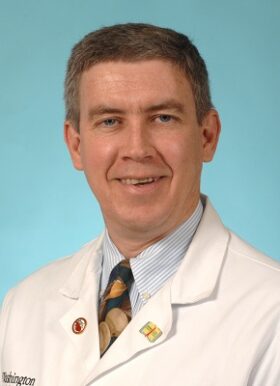
Richard G. Bach, MD, FACC
Professor of Medicine
Medical Director, Cardiac Intensive Care Unit
Director, Hypertrophic Cardiomyopathy Center
- Phone: 314-362-1291
- Fax: 314-362-7700
Related Links
Education
- BS (Magna cum Laude) Biological Sciences: Georgetown University, Washington, DC (1977)
- MD: New York University School of Medicine, New York, NY (1984)
- Intern in Medicine: Bellevue Hospital/NYU Medical Center, New York, NY (1985)
- Resident in Medicine: Bellevue Hospital/NYU Medical Center, New York, NY (1987)
- Research Fellow in Cardiology: Bellevue Hospital/NYU Medical Center, New York, NY (1988)
- Clinical Fellow in Cardiology: Bellevue Hospital/NYU Medical Center, New York, NY (1990)
- Fellow in Interventional Cardiology: NYU Medical Center, New York, NY (1991)
Board Certifications
- Cardiovascular Diseases
- Interventional Cardiology
Recognition
- Listed in “Guide to America’s Top Physicians,” by the Consumers Research Council of America, present
- Listed in “Who’s Who in Medical Science Education,” Academic Keys, present
- Elected to “Best Doctors in America” by selection of peers, present
- Elected to “Best Doctors in St. Louis”, by selection of peers, present
- Selected to America’s Top Doctors, by Castle Connolly Medical Ltd/US News & World Report, present
- Benico Barzilai Teaching Award, Awarded by the Fellowship Trainees, Division of Cardiology, Washington University School of Medicine, 2013
- Elected Fellow of the American Heart Association, by the Council on Clinical Cardiology, 2013
- Selected to US News Top Doctors list of the top 325 Interventional Cardiologists in the United States (by peer nomination), and among the top 50 according to the Castle Connolly Medical, Ltd list of America’s Top Doctors; US News & World Report, 2013
- Mission Impact Award, Quality Initiatives Honoree, St. Louis STEMI Committee, American Heart Association, 2012
Clinical Interests
Interventional cardiology, coronary angioplasty, atherectomy and stenting, valvuloplasty, peripheral intervention, percutaneous atrial septal defect closure, transcoronary alcohol septal ablation for HCM, cardiac catheterization, hypertrophic cardiomyopathy with obstruction, coronary ultrasonographic and physiologic assessment, cardiac critical care
Research Interests
My current research focuses on examining the phenotypic (anatomic, physiologic, and clinical) heterogeneity among patients with hypertrophic cardiomyopathy (HCM) and their family members, including genotype-phenotype relationships that may account for this heterogeneity, novel diagnostic methods to diagnose at risk individuals before clinically manifest disease, and on the effect of therapeutic interventions on coronary and myocardial physiology in patients with severe obstructive HCM. Research is also directed at management and outcomes of patients with coronary artery disease (CAD) and acute coronary syndromes.